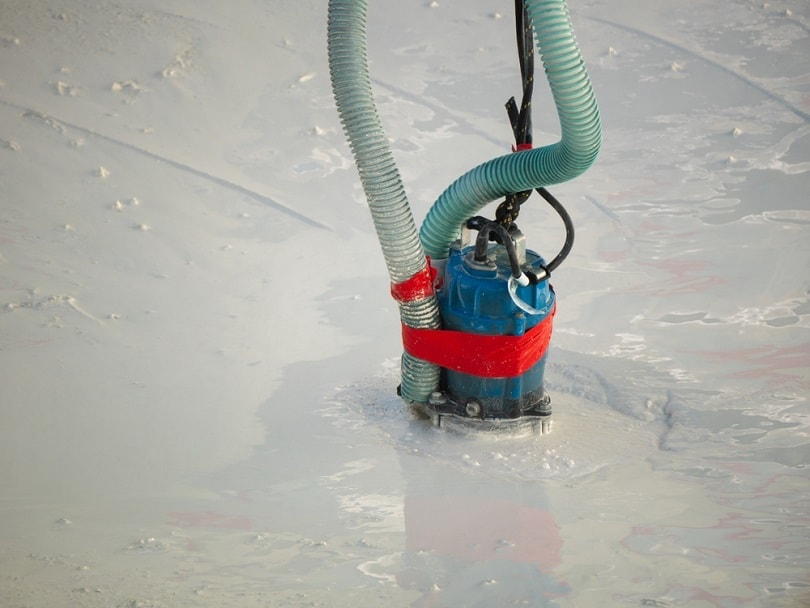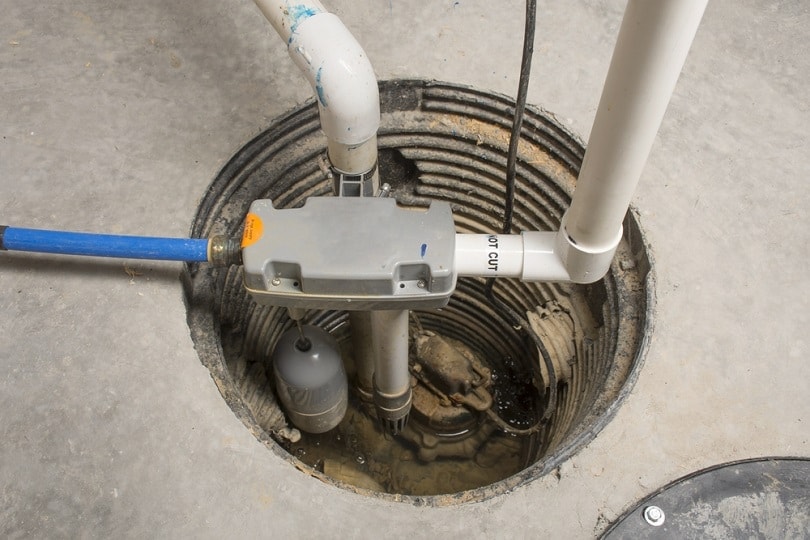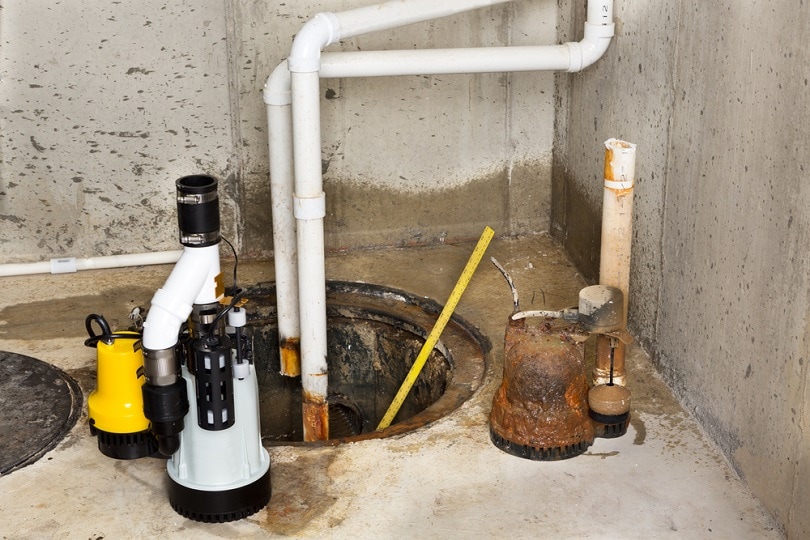How Often Should a Sump Pump Run? Get it Right!
-

- Last updated:


If you’ve a basement in your home, you probably have a sump pump. It’s fundamental to any basement water system. It protects it from flooding, which then saves you from paying for costly repairs in your home.
Despite the importance of the sump pump, most people are mystified about how it works. Most notably, some homeowners are clueless about how often it should run. If you need to know how often a sump pump should run, you’ve come to the right place. In this article, we take a look at how sump pumps should be running for maximum efficiency. Let’s take a look.
Sump Pump Overview
Before looking at how long a sump pump should run, let’s talk about what it is and how it works. Simply put, a sump pump is a small device that you install at the lowest point of your house. This will likely be in your basement or crawl space.
There are a variety of sump pumps to choose from. All are submersible, meaning that you will dig a small pit at the lowest point of your home and put the sump pump within it. Some may have above-ground parts, but most components are installed in the pit.

How It Works
How a sump pump works is straightforward. On a regular day, your sump pump should be on standby and should not be running nonstop. When your home begins to flood, the sump pump activates.
Sump pumps have float switches activated by water, which turn on the pumps. As your house becomes over-saturated, water will build up in the pit. This activates the float switch and turns on the pump.
Whenever the pump is turned on, water will be drained from the pit and taken safely away from your home to a drain, dry well, retention pond, or another area. This prevents the groundwater from flooding your entire floor.
- Protects against flooding
- Saves you money
- Protects against mold, mildew, or fungus
- Prevents against termites and other infestations
- Requires maintenance
- Requires power
- Not attractive
How Often Should a Sump Pump Run?
Now to the question, How often should a sump pump run? To answer the question simply, a sump pump should only run whenever needed. In other words, it should only run whenever a specific water level is met. Though that isn’t a very direct answer, it is the most accurate one.
If you live in an area that rains a lot, your sump pump should kick on often. Some homes require a sump pump to turn on a few times a day. In contrast, areas that see less rainfall will likely use a sump pump less.
Why Is My Sump Pump Constantly Running?
If you notice that your sump pump is running constantly or excessively, there are several possible reasons why. Elemental factors, such as the ground grade around your home, could be one contributing factor, but it could also be a sign that part of your sump pump is broken. Here are the most common reasons why your sump pump is constantly running:
Elemental Factors
Elemental factors often cause a sump pump to run frequently, but it will rarely run constantly. Still, you might notice your sump pump running even when it is not raining.
- The Groundwater Level and Drain Tile: The groundwater and drain tile around the home may force water to collect at the lowest level, such as in your basement. You cannot do anything to avoid those other than investing in a good sump pump. Also, try adding waterproof paint or professionally sealing your basement.
- Negative Ground Grade: A negative ground grade around your home’s foundation can cause rainwater to drain towards your home instead of away from it. This makes flooding more likely. Install a sump pump, but you must also build up the grade to redirect it. A landscaper or general contractor will be able to do this job correctly.
- Broken Underground Water Main: A broken underground water main can cause many problems. You can test this by shutting off the water main to see if that fixes the problem. You can also test for chlorine within the sump pump water.
- Underground Spring: Some underground springs or other natural water flow sources can cause excess water to build up. They can sometimes be seasonal or only occur occasionally. Similarly, if your home is beside a large body of water and your basement is below the water level, it could cause excess seepage.

A Broken Sump Pump Part
If your sump pump is constantly running, even when there is no water within the pump, there is something wrong with it. Since sump pumps are exposed to so much water, they must be repaired frequently.
Whenever you notice that your sump pump is acting up, treating the issue immediately is essential. If not, you could be jeopardizing your basement and home. Here is a list of commonly broken parts that lead to the sump pump running constantly.
- Broken Check Valve: A broken check valve ensures the water only flows one way. In other words, it ensures that the water pumped out of the sump does not come back through the pipe. A broken check valve can cause the water pumped out to come back in. This makes your sump pump continue running. Replace the check valve if it is broken.
- Too Little Power: If you have a large home or intense sump pump needs, the sump pump may be too small. The average home requires a 1/3 horsepower sump pump, which can pump 25 gallons of water per minute. You may need to invest in a more powerful sump pump that matches your home’s size and water level. Frozen/Clogged Discharge Line: The discharge line is how the water exits your home. If this line becomes frozen or clogged, the water can’t be pumped out of your house. As a result, your sump pump will keep running since the water is not draining. You will need to find the frozen spot or clog. You can test for a clogged spot by using a ShopVac.
- Clogged Pump or Switch: Sump pumps often do not have a lid. As a result, dirt, sludge, or pieces of debris can clog the pump or the switch. This makes it impossible to pump the water out. Make sure to keep the sump pump clean. Consider adding a cover over the top of the sump pump, especially if you have children or pets.
- Broken Float Switch: As discussed above, the float switch turns the sump pump on. From debris, a clog, or a simple broken part, the float switch can activate too frequently or get caught in the on position, even when the water has dropped. You will need to fix this part to avoid wasting any energy.
- Wrong Size Sump Pit: Just like you need the right power pump, you also need the right-sized pit. A sump pit that is too large or small prevents the sump pump from accurately reaching the water and pumping it out efficiently. Contact a plumber to find out exactly how large your sump pit needs to be for optimal drainage.
Frequently Asked Questions
Should my sump pump constantly run during heavy rainfall?
Sump pumps should run whenever excess water builds up in the pit. This is most likely to happen during heavy rain. As a result, it is normal for your sump pump to run constantly during heavy rainfall. This ensures that the water is being effectively pumped out of your home.
During heavy rainfall, water will often seep into the home, causing it to build up in the pit. This can cause your sump pump to run constantly, even for a couple of days, until the water is gone.
Should sump pumps run in the winter?
It is normal for sump pumps to run during the winter. Depending on your location, the winter may be when the local water table reaches its highest point. This causes the ground to be saturated and requires a sump pump. Other locations have seasonal underground springs that only flow in the winter. This is another common reason for the sump pump to run in the winter.
However, the winter can also cause the discharge line to freeze, making it impossible for the water to exit the home. This causes the sump pump to run constantly and should be fixed. Follow the steps above to fix this issue.
Why is my sump pump not turning on?
Sump pumps see a lot of wear and tear, meaning that they break easily. If your sump pump is not turning on, there is likely an issue with the pump.
- Broken float switch
- Not getting electricity
- Jammed pump impeller
- Overheated
- Broken entirely
You may be able to diagnose and repair the issue yourself. If you are uncomfortable inspecting the sump pump on your own, contact a local plumber.
How do you take care of a sump pump?
Since sump pumps see a lot of water, taking the time to maintain them can expand their lifespans dramatically. Here are some tips for maintaining your sump pump based on frequency:
- Clean the pump inlet screen.
- Check the power cord.
- Ensure the pump is connected to the power cord.
- Check the float by dumping a bucket of water into the sump pit. Make sure the sump pump turns on.
- Inspect the sump pump by removing, inspecting, and cleaning it.
- Consult the owner’s manual to see if it requires grease or oil. You can look this up on the Internet using the model number and manufacturer.
- Replace the sump pump’s pump
- Check the power cord.
- Ensure the pump is connected to the power cord.
- Check the float by dumping a bucket of water into the sump pit. Make sure the sump pump turns on.

Final Thoughts
Sump pumps are an important part of keeping your basement dry and mildew free. Your sump pump’s specific runtime will depend on where you live and how much rain you get. It should only run when there is excess water in the pit. If you notice that your sump pump is running too much or too little, you should fix the problem as soon as possible.
It will save you a lot of money down the line. Thankfully, fixing a sump pump is relatively easy and inexpensive. However, you can contact a professional plumber if you are uncomfortable fixing the sump pump.
Featured Image Credit: J Gillispie, Shutterstock
Contents


